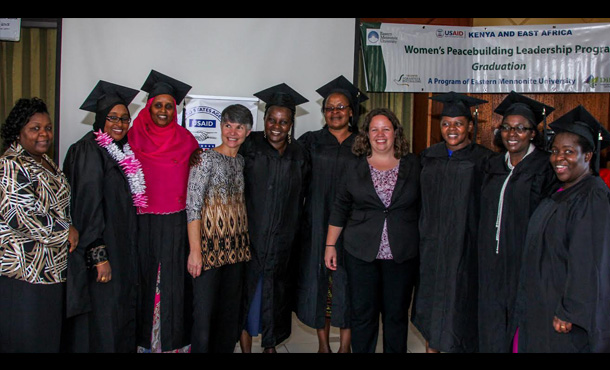Ruth Nalyanya works at a university in Kenya where ethnic conflicts regularly spilled over into campus life. She decided to address this negative pattern by conducting training sessions about acceptance and diversity. Then she started a Peace Club, followed by a Peace Choir and a Peace Band, and she brought in a variety of speakers. Her work eventually prompted the university to change the bylaws for student government elections, assuring the representation of minority groups. Now the administration plans to build peacebuilding training and initiatives into the university’s curriculum.
Nalyanya and 12 others from Kenya, Somalia and Somaliland became the newest graduates of the Women’s Peacebuilding Leadership Program (WPLP) in December, when members of two classes received their graduate certificate in peacebuilding leadership.
They join 29 previous graduates from Africa and the South Pacific who are making similar advances and repairing the fabric of their communities, thanks in large measure to the tools gained since the program started in 2012 at Eastern Mennonite University‘s Center for Justice and Peacebuilding.
Funding for WPLP is primarily provided through USAID Kenya and East Africa and by international development organizations that administer USAID grants.
“All of the women are doing amazing things in different sectors of the peacebuilding field,” WPLP acting director Leda Werner says. “They are all having big impacts in their communities and thinking about ways to scale it up and make larger systems change. They are just all really impressive women.”
The women are selected through an application process that seeks candidates with leadership skills and practical experience as well as a platform from which to engage their communities, Werner says. Studies begin with five weeks at the Summer Peacebuilding Institute in Harrisonburg, followed by coursework and a hands-on conflict analysis and development of an intervention plan in their home country. A mentor walks with them through the program.
Participants in WPLP often come from different tribes, ethnicities, religions and backgrounds but find common ground in the peacebuilding work.
“That’s one of the benefits of having the women together as a cohort,” Werner says. “They get to talk about those things. It’s pretty inspiring. They put those differences aside for the larger interest of their country. They want a peaceful Kenya or a peaceful Somalia, and peace for people in general. They learn from each other and begin to think about the ways that divisiveness has been created.”
Beyond expanding their leadership skills and bringing about change in their communities, the women also gain in confidence and increase their sphere of influence, Werner says.
Seven of the 13 women were present for the official graduation ceremony along with representatives from MCC Kenya, USAID Kenya and East Africa, and community members. Several mentors, friends and family members also attended, including Nelson Makanda, deputy general secretary of the All Africa Council of Churches, and Faustin Ntamushobora, former director of African Leadership and Reconciliation Ministries (ALARM).
Also present were SPI attendee Samson Sorobit and two women with long ties to CJP and to the Strategies for Trauma Awareness and Resilience (STAR) program: Tecla Wanjala, MA ’03 [read more about her truth and reconciliation work in Kenya] and local partner Doreen Ruto, MA ’06, who brought staff and board members from her organization, Daima Initiatives for Peace and Development (DiPaD).
WPLP’s fourth class, with eight women from Kenya, will begin in May. Applications will open for the fifth class, with eight women from the Horn of Africa, in the fall of 2016, with coursework to begin in May 2017.
Editor’s note: As this article was being published, the CJP community learned of Doreen Ruto’s untimely death on Jan. 21, 2016. She is remembered with both joy and sadness in this article.
